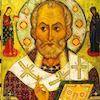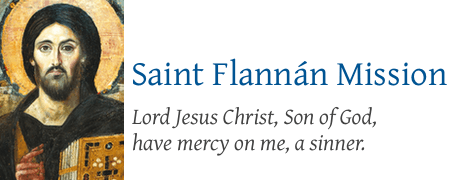 In the Name of the Father and of the Son and of the Holy Spirit, one God. Amen. Dear beloved, we remember one of the fathers among the saints, Saint Nicholas the Wonderworker, Archbishop of Myra.
In the Name of the Father and of the Son and of the Holy Spirit, one God. Amen. Dear beloved, we remember one of the fathers among the saints, Saint Nicholas the Wonderworker, Archbishop of Myra.
He stood for his fervent faith, charity, humility, and wonderworking for the healing and salvation of the people. He is now revered by much of Christendom, and one can find many cathedrals in the holy saint’s name. Saint Nicholas of Myra, father among the saints, pray for us!
As we fight against our own passions, not with sadness or lament, but with joy and spirit, in this season of the Nativity Fast, we know that fasting is not merely an abstinence from certain foods. It is also a time to reflect upon our selves and pray for the mercy of God, that His abundant mercy can be understood and felt by us all. God’s mercy is constant, it is often, merely our own blindness and deafness that prevent us from feeling, experiencing, and basking in His brilliant and warming mercy.
Let this season be a time for us to reflect, pray, and also, especially, to remember the plight and suffering of the poor. As we reflect on Proverbs 21:10-14 and Psalm 41:1-3 (LXX 40), let us remember our God’s desire to grant us His mercy, even at times of grave danger and troubles, when we show mercy and charity to others in need. It is not a barter, but a reflection of our own spiritual journey of loving one another with joy, without prejudice, that we become transfigured into what God hoped in us.
St Nicholas the Wonderworker, Archbishop of Myra, was one of the shining examples of unceasing compassion and humility for the salvation and healing of others.
The saint was pious throughout his life, even at his infancy, when he would receive milk from his mother only after his parents prayed. Born into a wealthy family, as a child, he studied Holy Scripture, and loved to be in Church. Eventually, Bishop Nicholas of Patara raised St Nicholas to the holy priesthood when he reached adulthood. The saint was knowledgeable of the Scriptures, fervent in his faith and prayer, and especially compassionate towards the sick and the poor. Even though he was with much wealth from his family, he donated all his money away.
One example was when a previously rich person wanted to sell his daughters chastity for food, the saint secretly throw a bag of gold through an open window of the man’s house. The man, with the gold from St Nicholas, was able to marry his daughters off, and the entire family was saved from spiritual ruin due to poverty. The saint was always giving to the poor and the needy in secret.
The saint is also the patron of seafarers, for he prayed for the safety of pilgrims on a ship when the evil one sought to destroy the people through a storm. The saint’s prayers was able to save the people on the ship through the Divine Mercy of God.
Even though the saint sought the reclusive life, God told the saint that he was to bear fruit in the world and glorify God’s Name there. Eventually, the saint was consecrated as Bishop of Myra. When Archbishop John of Myra reposed, one of the bishops had a vision that the first man named Nicholas to enter the Church would be consecrated as the new Archbishop. The next day, Saint Nicholas arrived at Church, always the first person, and was asked by the elder bishop with the vision, “What is your name, son?” The saint replied, “I am Nicholas, Master, and I am your servant.”
Even after being consecrated as Archbishop, the saint was a true ascetic, and always loved his people with paternal kindness and compassion. During the persecution of Christians by the emperor Diocletian, the saint was arrested, imprisoned and tortured. But God kept the saint unharmed. Eventually, the saint was released and he returned to his people and continued to served his archpastoral role.
The saint was gentle and kind to all, and yet was a courageous defender of the Christian faith. During the First Ecumenical Council in the year 325 when the Nicene Creed of Faith was universally declared, the saint stood up against the heretic Arius, and was said to have slapped Arius.
The saint was one attributed with many miracles in his time and beyond. His holy prayers saved people from famines, wrongful execution, imprisonment, and so on.
The saint reposed peacefully at a ripe old age. His incorrupt relics in the Cathedral would flow forth healing myrrh which worked for many. His relics remain in Bari, Italy, today.
The saint was gifted with much, including material wealth, and yet, he gave the wealth away to the poor and needy, silently and quietly. As we reflect upon St Luke 6:17-23, we would understand that as Christians, our joy and aim is not the material in the world, but that of the Kingdom of Heaven. Our Lord blesses some of us with material wealth, so that we can also, like Saint Nicholas, be joyously giving away to the needy, without seeking any returns.
Likewise in Hebrews 13:17-21, we are blessed to find the benediction that through the Blood of the new covenant, we can find joy and strength in the Lord’s mercy, to continue to do the good works for the glory of God, and for the salvation of others who walk in our paths through God’s Divine Will.
Let us, in the joyous season, remember the many blessings of our Lord and God, in the intercessory love and prayers of our Panagia, Most Holy Theotokos, Mother of God, all the hosts and saints in Heaven, as we call humbly the Holy Name, “Lord Jesus Christ, Son of God, have mercy on me, a sinner”.
Let us close by praying the thanksgiving prayer:
It is truly meet to call thee blest, the Theotokos, ever blessed and most pure, and the Mother of our God. More honorable than the Cherubim, and more glorious than the Seraphim, without corruption thou gavest birth to God the Word: True Theotokos, we magnify thee.
O virgin Theotokos, rejoice; O Mary full of grace, the Lord is with thee. Blessed art thou among women, and blessed is the fruit of thy womb, for thou hast borne the Savior of our souls, Jesus Christ our Lord. Amen.
Fr Raphael+
Readings
Proverbs 21:10-14
Psalm 41:1-3 (LXX 40)
St Luke 6:17-23
Hebrews 13:17-21

